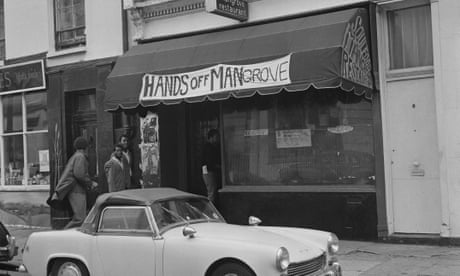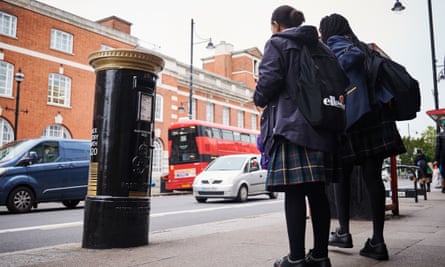Why do we need Black History Month? Because too many people still reject it
Rightwing push-back on the idea that British history should encompass the black experience makes it all the more urgent
Diane Abbott

Mon 19 Oct 2020
Black History Month has never been more relevant than in 2020. The Black Lives Matter movement has swept blackness to the heart of the political discourse. For me, it brings back memories of the upsurge of black activism in the 1980s, when I first entered politics.
In the 1980s, black people took to the streets of the UK, which partly reflected the US civil rights movement, but was also about the emergence of a new generation of black activists in this country. “Here to stay, here to fight,” was one of our favourite slogans on demonstrations. Importantly, riots erupted in cities all over the country, sparked by decades of injustices suffered by black communities at the hands of the police and other institutions. The riots started in Brixton, south London, in 1981. And there were other related uprisings in Handsworth, Birmingham; Southall, west London; Toxteth, Liverpool; Hyson Green in Nottingham; and Moss Side in Manchester. Black people taking to the streets in the 80s was probably the single most important factor in moving the fight for racial justice up the political agenda, and led to the election of myself and three other people as the first black members of parliament. It also made initiatives such as Black History Month possible.

The story of the Mangrove Nine
The move to the left in Labour, particularly in London, was also significant. The leadership of the party may have regarded with horror the “black sections” campaign, which I and other black members of the party set up to address racism and promote ethnic minority candidates within Labour, but Black History Month came from the left of the party. It was no coincidence that Akyaaba Addai-Sebo, an officer of the Greater London Council (GLC), organised the very first Black History Month in Britain.
In a later interview, Addai-Sebo said that although he had initiated the idea, it was a collective effort, and it could not have been achieved without the London strategic policy unit, which was an organisation established after the Thatcher government abolished the GLC in 1986.
Among the many people involved in creating Black History Month, he mentions some of the first black MPs, Bernie Grant and Paul Boateng (now a Labour peer), and local politicians of the day, including Linda Bellos, Herman Ouseley and Ken Livingstone.
These were all big figures in the municipal socialism of the era. And there were many other council officers who were actively involved. In fact, it has been leftwing local authorities that have provided much of the funding for Black History Month over the decades.
In recent years there has been a lull in interest in Black History Month. It is still a mainstay of school curriculums, but there has been a backlash from both the right and the left. Black activists routinely described it as tokenistic. The usual argument was that every month should be Black History month. Now Black Lives Matter has brought issues about black people and history to centre stage once more.
Amazingly, institutions at the heart of the British establishment, from the Bank of England to the National Trust and the City of London, along with Oxbridge colleges and our leading museums, are now having unprecedented discussions about black people and British history.
But there has been a serious push-back by some rightwing pundits and politicians against the idea that British history should also encompass the black experience.

‘Black Lives Matter has brought issues about black people and history to centre stage once more.’ A postbox honouring black Britons. Photograph: Leon Neal/Getty
In Hackney, east London, we have the well-known Museum of the Home (until recently called the Geffrye museum), which was funded by the slave trader Robert Geffrye. His statue stands in pride of place. But in the wake of Black Lives Matter, the museum had a public consultation about whether the local community wanted a slave trader honoured in this way. Residents said that the statue should be taken down. However, on hearing this decision, the culture secretary, Oliver Dowden, took the trouble to write to the museum, reminding it that it was funded by the government, which was strongly opposed the statue being moved. Sadly, the museum caved in to government pressure. And the statue of a man who made his money out of trading in black Africans still looms over multicultural Hackney.
It’s not just Tory ministers such as Dowden, or the men who organise counter-demonstrations to Black Lives Matter events, ostensibly to “protect” statues, for whom it seems black lives emphatically don’t matter when it comes to how Britain frames it history. There are still too many people who resist the idea that black people and our history should be accepted as part of the sweep of British history.
This is why Black History Month remains extremely relevant, and is worth keeping and fighting for. The fight for racial justice must always have an appreciation of our culture and history at its heart.
• Diane Abbott is the Labour MP for Hackney North and Stoke Newington
• To buy the Guardian’s black history wallcharts, visit the Guardian bookshop and use code 15CHART for a 50% discount
In Hackney, east London, we have the well-known Museum of the Home (until recently called the Geffrye museum), which was funded by the slave trader Robert Geffrye. His statue stands in pride of place. But in the wake of Black Lives Matter, the museum had a public consultation about whether the local community wanted a slave trader honoured in this way. Residents said that the statue should be taken down. However, on hearing this decision, the culture secretary, Oliver Dowden, took the trouble to write to the museum, reminding it that it was funded by the government, which was strongly opposed the statue being moved. Sadly, the museum caved in to government pressure. And the statue of a man who made his money out of trading in black Africans still looms over multicultural Hackney.
It’s not just Tory ministers such as Dowden, or the men who organise counter-demonstrations to Black Lives Matter events, ostensibly to “protect” statues, for whom it seems black lives emphatically don’t matter when it comes to how Britain frames it history. There are still too many people who resist the idea that black people and our history should be accepted as part of the sweep of British history.
This is why Black History Month remains extremely relevant, and is worth keeping and fighting for. The fight for racial justice must always have an appreciation of our culture and history at its heart.
• Diane Abbott is the Labour MP for Hackney North and Stoke Newington
• To buy the Guardian’s black history wallcharts, visit the Guardian bookshop and use code 15CHART for a 50% discount
No comments:
Post a Comment